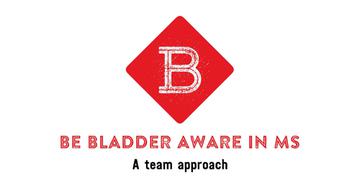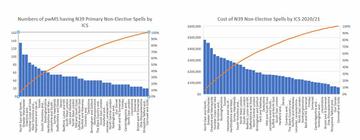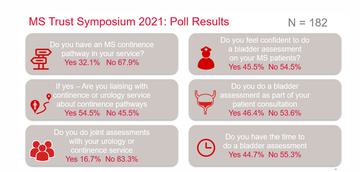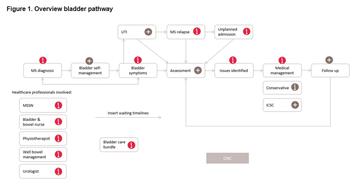MS Awareness Week: the importance of bladder management
NewsBladder problems are common in multiple sclerosis (MS), with one out of ten people reporting them at diagnosis. Due to the progressive nature of MS lower urinary tract symptoms and dysfunction increases over time and reaches close to 100% within 10 years. They can be embarrassing to discuss, and greatly impact quality of life if not managed correctly. They can also increase the likelihood of urinary tract infections (UTIs) which, if undetected, can exacerbate MS symptoms and result in emergency hospitalisation (Fowler 2015).
This MS Awareness Week, MS Academy is focussing on #BeBladderAwareinMS highlighting the need for a team approach to management and for all people with MS to be bladder aware.

MS Academy is highlighting some of the brilliant work by healthcare professionals across the UK showcasing the importance of bladder management and the practical ways they are improving care.

infographic taken from www.bladdermanagement.co.uk
What the numbers say
A poster by specialist nurses Gale Metcalfe and Audrey Owen at the recent MS Trust national conference highlighted the significant cost of urinary tract infections to the NHS, presenting compelling evidence to increase efforts to focus on prevention and improve this aspect of care (fig 1, fig 2).

Figure 1: Call out box detailing 2020/2021 data on UTI admissions in MS from Metcalfe, Owen, Stross and Thomas (2022)

Figure 2: The two nurses examined the variance in bladder-related admissions across integrated care systems (ICS)
An infographic presenting data on emergency admissions in MS based on hospital episodic statistics (HES) for 2019/2020 found that 9.5% of all emergency admissions for MS were due to urinary tract infections, and thus likely preventable. Furthermore, each admission cost the NHS £2,916 (MS Academy & Wilmington Healthcare, 2020).

Figure 3: An excerpt from an MS Academy and Wilmington Healthcare infographic reviewing MS emergency admissions for 2019-2020 data (Jan 2020)
This data, demonstrating a consistent level of unnecessary admissions owing to bladder problems, provides strong evidence for preventative care and supportive services around bladder management in MS.
However, as another poster of bladder management at the MS Trust succinctly summarised:
Cited from poster by Stross R, Thomas S & Mehta S – on behalf of the MS bladder pathway consensus group. Management of bladder dysfunction in multiple sclerosis: consensus guideline and national pathway
The development of consensus guidance and a national pathway have resulted from a symposium held in 2021 where MS nurse specialists indicated variation in bladder management and the need to address this.

Figure 4: MS Trust 2021 poll results infographic
The consensus bladder guidelines were published earlier this year and are open access for professionals. How this work originated is detailed in a webinar being broadcast in MS Awareness week. Visit www.bladdermanagementwebinars.co.uk to book your place.

Figure 5: Expert consensus guidance for bladder management in MS

Figure 6: Draft Overview national bladder pathway taken from poster Stross R, Thomas S & Mehta S – on behalf of the MS bladder pathway consensus group. Management of bladder dysfunction in multiple sclerosis: consensus guideline and national pathway
At a local level nurse, Ruth Stross and Clinical Fellow in Neurology Dr Ioana Cociasu carried out a local mapping project for their Intermediate MS MasterClass intermodule project, which prompted a cascade of service improvements around bladder management in MS at both a local and national level.
The mapping project, which won their class intermodule project award highlighted a lack of bladder management and triggered a number of local initiatives such as a local bladder pathway, and an innovative home urine testing kit employed during the coronavirus pandemic provide preventative support against urinary-tract infection (UTI) in MS (fig 7).

Figure 7: Call out box detailing the Home UTI testing kits, taken from poster Stross R & Thomas S. Translating data into service change: Bladder & bowel management for MS
The difference good care makes
The MS Leaders Academy focused on reducing emergency admissions in their workplace project, and the outcome was a vision for a digital solution called MSUnite. They produced a short animation which focused on a fictitious woman called Esther, newly diagnosed, and the impact that a UTI had on her life and condition without appropriate intervention - versus a scenario where she received timely support and information. It demonstrates the importance of access to information, preventative education, and timely interventions.
An interview with some of the healthcare practitioners behind the concept provides background and explores the exciting potential of MSUnite, and some of the ways that digital interventions might improve bladder management and prevent unnecessary hospital admissions. The short animation, 'Esther's story', demonstrates how these ideas could be translated into practice.

Esther's story: a fictitious case study
Esther is 32 years old, has a new baby, is deputy head of a local school, goes kayaking and walks the dog.
Without good care…
After falling a lot and noticing other symptoms she is diagnosed with MS. She starts to become isolated trying to cope with this diagnosis, a new baby, her marriage and work. She searches online for information and becomes frightened.
She develops a urinary tract infection (UTI) and her mobility worsens. Without support and advice she attends A&E who do not have her notes. In her panic she has not brought any information with her. They give her a course of steroids without testing her urine. Four days later her MS team is notified and she is finally given the advice she needs to manage her symptoms. After an eight-day hospital stay, she is able to go home.
With ideal care: an aspirational digital scenario
MS unite vision is a platform for ’Anyone, Anywhere, Anytime’ with ‘Everything in one place’.
Esther now has access to information in one place, to track her symptoms, send messages to her MS team, check appointments and log her diet and exercise. When she experiences urinary symptoms she inputs them into the MS Unite platform which automatically sends her a home urine test kit. Once she has tested she has a virtual appointment at 4am with an MS nurse in Australia who advises on antibiotic treatment, which is then prescribed locally.
The MS Unite doctor notices that this is the third time in 12 months she has had a UTI and refers her for a neuro-urology assessment. The neuro physiotherapist picks up on the change in her symptoms via the online platform and arranges for an appointment.
Esther is now able to return to work, she has the confidence to meet up with friends, her husband feels supported and she enjoys time with her family. Esther is able to get on with her life with the knowledge that support, information, advice and the action required is available in one place.
The imagined platform, which is being explored as a reality, arranges safe and efficient transfer of information between services, so no excessive paperwork, input of new symptoms, efficient information sharing and timely referrals and a clear pathway through MS from onset of symptoms to diagnosis modelled on the OPTIMUM clinical pathway: multiple sclerosis
Whilst the version of good care in Esther's story is an aspirational model, the OPTIMUM care pathway for MS provides a strong model which can be applied locally through cross-organisational efforts; services supporting people with MS in Liverpool are currently translating the national pathway to their local space, led by Dr Ian Pomeroy.
The digital solution is not such an extremely new idea either; with digital tools like MS Connect, has been developed and is currently in use in the Torbay area in Devon, led by Dr Agne Straukiene. This is transforming elements of care and support and providing a single point of information and contact.
Esther's story highlights that bladder management is not something to support in isolation, but has an important place in the wider care pathway, and is tied to supportive self-management and appropriate information. To #BeBladderAwareinMS involves focussing on bladder management itself, but also broadening the gaze to see its place in the bigger picture of delivering the best possible care to people living with MS..

Top tips to improve bladder management
Ask.
Bladder problems can be embarrassing for someone with MS to bring up in a consultation, so please take the lead in the conversation and ask them.Encourage self-management.
Providing information on bladder management, education on early warning signs for UTIs and a direct contact if they suspect a UTIMake friends with your continence team.
The continence service can provide expert support to people with MS experiencing problems with their bladder, and by working in tandem with neurology, together the services can provide the best possible care and support to the person with MS.Review your bladder services.
Improvements to bladder services across the country, including those highlighted here, generally begin with an audit or assessment of current services or hospital data. Once you know where you are starting from, you can begin to make changes as needed.
Related articles
Encouraging excellence, developing leaders, inspiring change
MS Academy was established in 2016 and in that time has accomplished a huge amount with exciting feedback demonstrating delegates feel inspired and energised along their personal and service development journeys. The various different levels of specialist MS training we offer are dedicated to case-based learning and practical application of cutting edge research.


